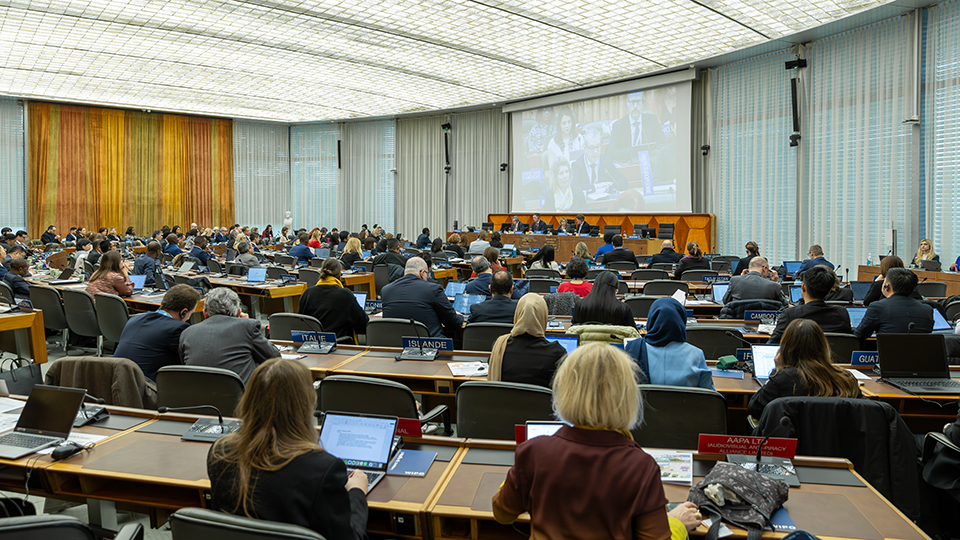Observancia de la propiedad intelectual
¿Qué es la observancia de la PI?
Los derechos de PI son activos valiosos para las empresas y los particulares, ya que permiten proteger ideas innovadoras, soluciones tecnológicas, marcas y obras creativas. La mera obtención de derechos de PI no puede garantizar que no se infrinjan. La observancia de esos derechos de PI es crucial para que los innovadores, los empresarios y los creadores logren sus objetivos.

Proteger la innovación y la creatividad: Danny Marti habla de la lucha contra los delitos de PI
Observancia de los derechos de PI en virtud del Acuerdo sobre los ADPIC
La Parte III del Acuerdo sobre los Aspectos de los Derechos de Propiedad Intelectual relacionados con el Comercio (Acuerdo sobre los ADPIC) establece las normas jurídicas mínimas en relación con la observancia de la PI. Los miembros de la Organización Mundial del Comercio (OMC) son libres de determinar el modo de aplicación de las disposiciones del Acuerdo sobre los ADPIC en su ordenamiento jurídico para lograr un equilibrio entre los intereses privados y públicos.
Los recursos civiles y penales del Acuerdo sobre los ADPIC incluyen medidas provisionales, procedimientos civiles y administrativos, medidas en las fronteras y procedimientos y sanciones penales.
¿Desea más información?
En la base de datos mundial WIPO Lex encontrará información jurídica sobre la observancia de la PI, como las leyes y reglamentos en materia de PI, los tratados administrados por la OMPI y relacionados con la PI, y las principales resoluciones judiciales.
Jurisprudencia sobre PI
En la página de recursos de Internet sobre jurisprudencia en materia de propiedad intelectual encontrará una recopilación no exhaustiva de enlaces a bases de datos en línea que contienen decisiones o extractos de decisiones en el ámbito de la legislación sobre propiedad intelectual.
¿Por qué hacer valer los derechos de PI?
La observancia de la propiedad intelectual significa cosas diferentes para las distintas partes interesadas. Para las empresas, se trata de un mecanismo jurídico fundamental para proteger sus inversiones y garantizar una competencia leal. Para los consumidores, ayuda a garantizar la calidad y seguridad del producto. Para los gobiernos, es una forma de proteger los ingresos necesarios para importantes servicios sociales y de garantizar un entorno empresarial sano y equitativo, necesario para atraer inversiones.

2,5 % del comercio mundial

+ 130 000 decomisos aduaneros

Aproximadamente el 10 % de todos los medicamentos

34 % menos de posibilidades de supervivencia
Tipos de infracción de la PI
La infracción de marca se produce cuando hay un uso no autorizado de una marca registrada o signo similar para identificar productos y servicios idénticos o similares a los amparados por la marca registrada que pueden inducir a confusión entre los consumidores sobre el origen de los productos y servicios en cuestión.
La falsificación de marcas es una categoría especial de infracción de marcas. Consiste en el uso no autorizado de cualquier signo, idéntico o indistinguible en sus aspectos esenciales de la marca registrada, en relación con productos o servicios idénticos a aquellos para los que la marca está registrada.
La infracción del derecho de autor consiste en utilizar, reproducir, distribuir, adaptar, representar o exponer una obra protegida por el derecho de autor sin el consentimiento del titular del derecho o de los derechos conexos.
La piratería de derechos de autor es un tipo especial de infracción del derecho de autor que consiste en la reproducción de una obra protegida sin el consentimiento del titular de los derechos.
La infracción de las indicaciones geográficas se produce cuando esos signos distintivos se utilizan sin la autorización de los titulares de los derechos y de forma que sugieran falsamente que los productos etiquetados con esos signos proceden de una región geográfica específica. Ello puede generar confusión entre los consumidores sobre el verdadero origen geográfico y las cualidades especiales de los productos.
En general, la protección de los secretos comerciales confiere a los titulares el derecho a impedir que la información que está legalmente bajo su control sea divulgada, adquirida o utilizada por terceros sin su consentimiento de forma contraria a los usos comerciales honrados. Aunque la determinación final de si se vulnera o no la protección del secreto comercial depende de las circunstancias de cada caso, en general, las prácticas desleales con respecto a la información secreta incluyen el incumplimiento de contrato, el abuso de confianza y el espionaje industrial o comercial.
El papel de la OMPI en la observancia de la PI
En primer lugar, la OMPI -en el seno de la División de Fomento del Respeto por la PI- alberga el Comité Asesor sobre Observancia (ACE), que es el foro internacional por excelencia para que los Estados miembros y las partes interesadas debatan cuestiones de actualidad relacionadas con la observancia de la PI y el fomento del respeto por la PI. La OMPI también proporciona asistencia legislativa y programas de capacitación a sus Estados miembros, desarrolla y gestiona sistemas para que los Estados miembros y las partes interesadas los utilicen en la lucha contra la falsificación y la piratería, proporciona asistencia para la sensibilización y colabora con organizaciones no gubernamentales (ONG) y otras organizaciones intergubernamentales (OIG) en la lucha contra la falsificación y la piratería.

Types of IP infringement

Trademark infringement
Trademark infringement occurs when there is an unauthorized use of a registered trademark or similar sign to identify identical or similar products and services as those covered by the registered trademark that lead to likelihood of confusion among consumers about the origin of the goods and services that are identified by these signs.
Trademark counterfeiting is a special category of trademark infringement. It consists of an unauthorized use of any sign, which is identical to or indistinguishable in its essential aspects from the registered trademark, in relation to goods or services which are identical with those for which the trademark is registered.

Copyright infringement
Copyright infringement involves the acts of use, reproduction, distribution, adaptation, performance or display of a copyrighted work without the consent of the copyright holder or the related rights holder.
Copyright piracy is a special type of copyright infringement consisting of the reproduction of a copyrighted work without the consent of the right holder.

Patent infringement

Industrial design infringement

Geographical indication infringement

Trade secrets
Más información sobre la observancia de la PI

Miniserie de audios: Atención a la observancia de los derechos de autor

